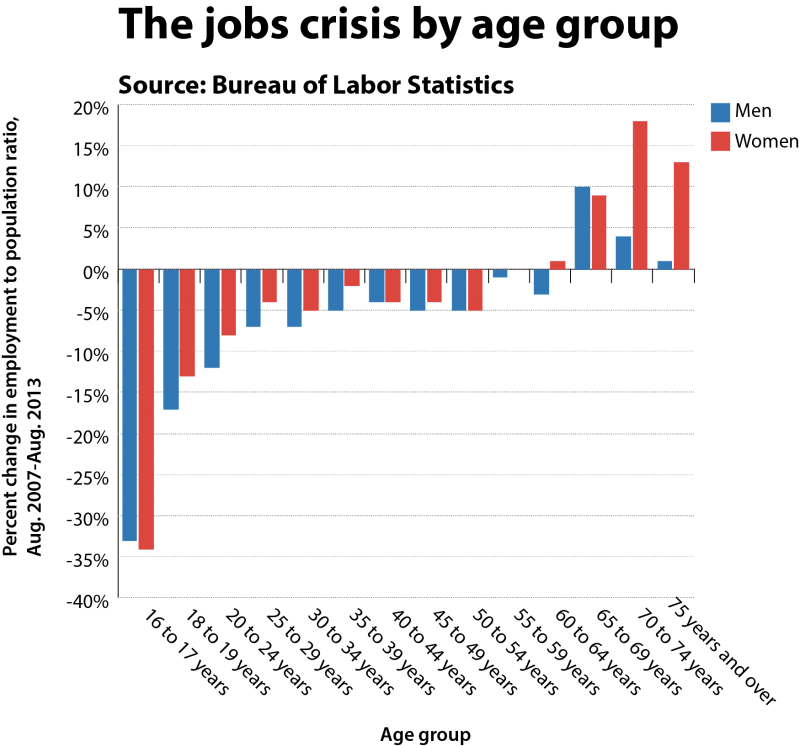Via Brad DeLong, Dylan Matthews, Forget the unemployment rate. Here’s the chart to focus on on jobs day:
This tells a pretty clear story. The share of young people working — especially in their late teens, but up until their mid-20s too — is down pretty dramatically. There have been sizable (around 5 percent) reductions in the share of people ages 25 to 55 working. And older workers — especially women — are hanging onto their jobs for much longer than they did during boom times.
I’ll wager that older workers are hanging onto their jobs longer less because they find work satisfying than because they weren’t able to save enough for retirement. They need them to pay the bills.
Paul Krugman, Years of Tragic Waste (as excerpted by Mark Thoma, emphasis mine):
In a few days, we’ll reach the fifth anniversary of the fall of Lehman Brothers — the moment when a recession, which was bad enough, turned into something much scarier. Suddenly, we were looking at the real possibility of economic catastrophe.
And the catastrophe came.
Wait, you say, what catastrophe? Weren’t people warning about a second Great Depression? And that didn’t happen, did it? … The important thing, however, is to realize that … you can have an immense failure of economic policy that falls short of producing total collapse. And the failure of policy these past five years has, in fact, been immense. …
Set aside the politics for a moment, and ask what the past five years would have looked like if the U.S. government had actually been able and willing to do what textbook macroeconomics says it should have done… I’ve done a back-of-the-envelope calculation … It would have been about three times as big as the stimulus we actually got, and would have been much more focused on spending rather than tax cuts.
Would such a policy have worked? All the evidence of the past five years says yes. … Government spending on job creation would, indeed, have created jobs.
But wouldn’t the kind of spending program I’m suggesting have meant more debt? Yes… But … the ratio of debt to G.D.P. … would have been only a few points higher. Does anyone seriously think that this difference would have provoked a fiscal crisis?
And, on the other side of the ledger, we would be a richer nation, with a brighter future…
Look, I know that as a political matter an adequate job-creation program was never a real possibility. And it’s not just the politicians who fell short: Many economists, instead of pointing the way toward a solution of the jobs crisis, became part of the problem, fueling exaggerated fears of inflation and debt.
Still, I think it’s important to realize how badly policy failed and continues to fail. Right now, Washington seems divided between Republicans who denounce any kind of government action — who insist that all the policies and programs that mitigated the crisis actually made it worse — and Obama loyalists who insist that they did a great job because the world didn’t totally melt down.
Obviously, the Obama people are less wrong than the Republicans. But, by any objective standard, U.S. economic policy since Lehman has been an astonishing, horrifying failure.

